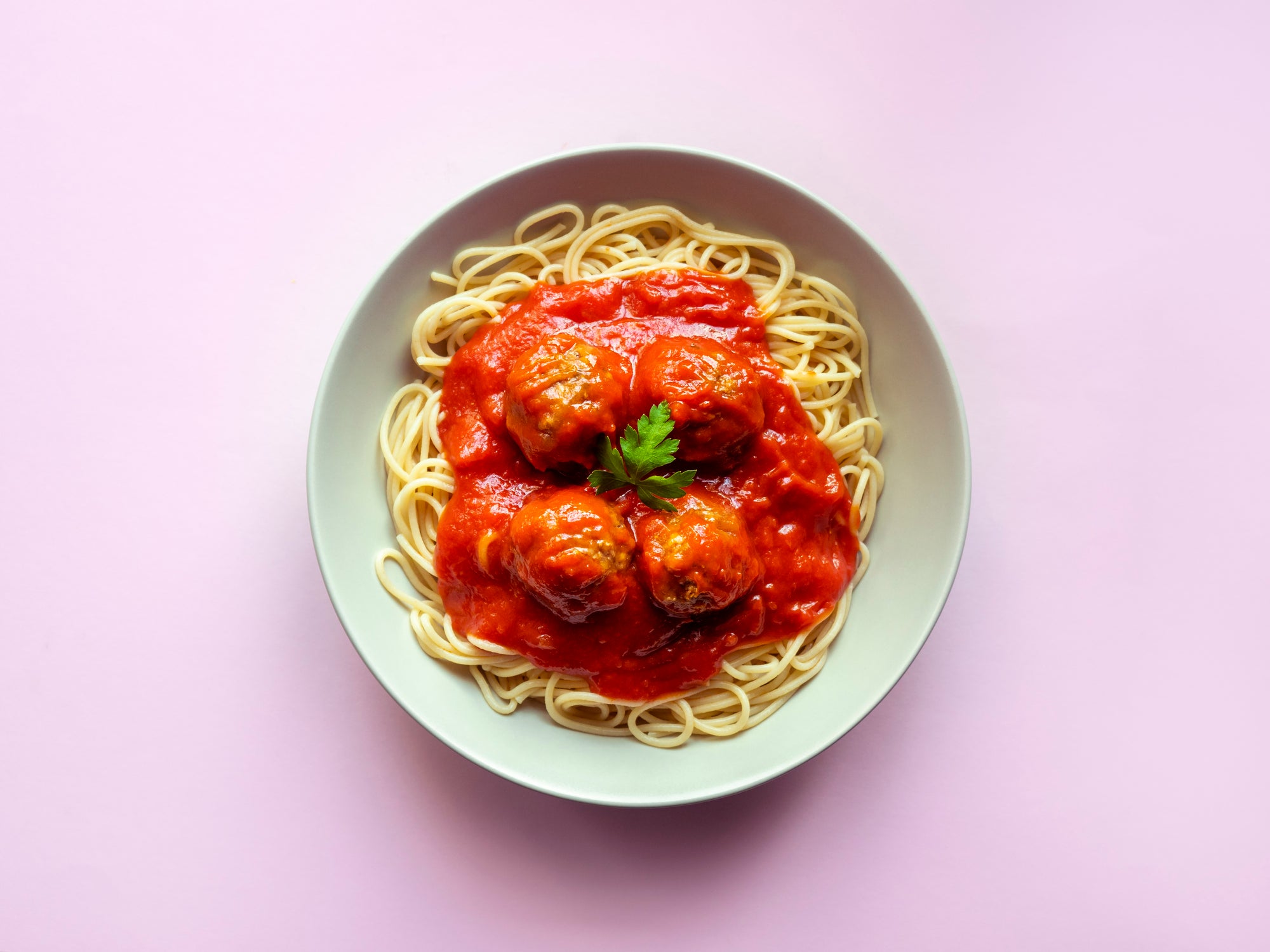Are You Eating Enough Carbs After Your Run?

Spaghetti with meatballs and tomato sauce on pink background
As early as the 1850s, scientists have been studying glycogen, a unique energy storage system for carbohydrates, in the human body. About 70 years later scientists discovered an apparent link between fatigue in marathoners and carbohydrates as a fuel source. But it wasn’t until the 1960s that it was confirmed that muscle glycogen played a major role in endurance performance.
Since then? Scientists like Brent Ruby from the University of Montana argue that the whole conversation has become oversaturated with fad diets, quick fixes, and recovery products marketed with unsubstantiated claims.
RELATED: Ask The RDN: Should I Eat Within 30 Minutes After My Run?
It’s true that muscle glycogen reserves are essential for prolonged, intense exercise (like a marathon or a long training run). And not properly restoring that lost muscle glycogen—which happens through the consumption of carbohydrates—can lead to low blood sugar, fatigue, and can affect performance.
Knowing that, runners and other endurance athletes might be eager to hear what the “perfect” recovery food or drink might be (the secret sauce, if you will). For years, the researchers at The Montana Center for Work Physiology and Exercise Metabolism have been studying various recovery diets to try and prove that the recovery market has become unnecessarily overcomplicated.
“[Sports nutrition has] become this really odd cult culture of ‘This is the best practice,’” says Brent Ruby. “It’s like, you’re making it so complicated that you’re making it inaccessible for individuals that are really depleting things on a regular basis.”
RELATED: Understanding Glycogen, Your Body’s High-Performance Fuel
In their most recent study, Ruby and his team looked at the recovery effects of one of the most basic foods: potatoes. And they found that, yes, potatoes are just as good for glycogen recovery as popular sport supplement food and drinks.
“You could argue that potatoes are just a surrogate carbohydrate for any carbohydrate,” says Ruby. “You could replace potatoes with rice, bagels, whatever.”
In the study, published in the European Journal of Applied Physiology, they looked at an equal number of male and female athletes. The subjects consumed one of two diets immediately after a 90-minute glycogen depleting cycling session and again two hours later. The diets were either sports supplement–based (first: rehydrate salt tablet, Powerade, Lara Bar, Gatorade energy chews; second: rehydrate salt tablet, Gatorade drink, Cliff Bar, and Cliff Bloks Energy Chews) or potato-based (first: potato pancakes, syrup, apple sauce, hash browns; second: potato gnocchi with pasta sauce and french fries). The total macronutrients in both diets were comparable, and they found that the muscle glycogen recovery was equal in men and women under both diets.
The key takeaway from the study, according to Ruby, is the number of carbohydrates consumed. “It can come from this source or it can come from [another] source, and regardless of how you pour it in to the vessel, the body, the muscle is going to respond favorably—as long as the macronutrient distribution, specifically the amount of carbohydrates relative to body mass, are provided,” says Ruby.
RELATED: Ask The RDN: How To Fuel For A Long Run
That sweet spot of carb intake after a depleting workout is 1.2 to 1.6 grams of carbs per kg of body weight directly after the exercise and again at two hours. With just a little math (hello, kg to lb converter), you can open up your recovery meals to more options. A 150-pound woman, for example, would need between 81 and 102 grams, which is equivalent to a bowl of oatmeal with yogurt, nuts, and a sliced apple, with a side of toast.
“Not only is it simpler, it’s also more sustainable. Humans like to have a diverse diet,” he says.
Ruby, who is a former runner and jokingly refers to himself as a recovering triathlete, hopes his research will allow endurance athletes to cut themselves some slack and be more playful with their meal planning when it comes to glycogen recovery. “You can be more selective and during those training sessions, start to become creative,” he says. “Develop your own food practice journal of what works, what doesn’t work.”
To spark your imagination, here are some good carbohydrate sources:
- Steel-cut oats
- Whole-grain toast
- Tortillas
- Bagels
- Brown rice
- Quinoa
- Fruit (oranges, apples, bananas, blueberries, mangoes)
- Potatoes (pancakes, gnocchi, hash browns, baked potatoes)
- Chickpeas
- Lentils
- Yogurt
- Milk